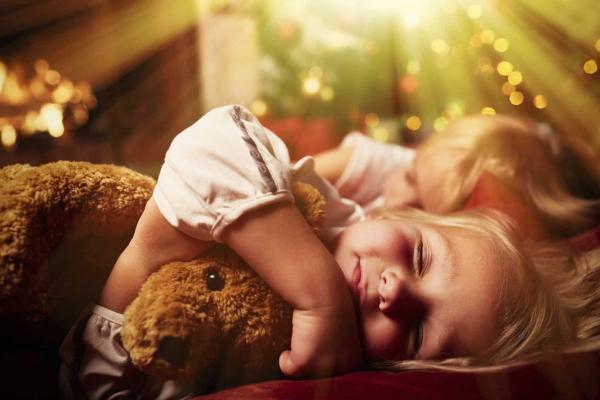
Awaiting the opening of presents the night before Christmas is among holiday-season factors that disrupt kids' sleeping schedules.
And sleep-deprived children hold the potential to destroy yuletide joy they waited for all year.
"It's fun to experience the holiday season through your (childs') eyes, whether it's (their) first Christmas, or the first one (they) remember," Ann Douglas wrote for Today's Parent. "But it can be challenging also as the excitement and change of routine lead many babies, toddlers and older kids to become sleep deprived and grouchy enough to out-grinch the Grinch."
Because of that, noting techniques to keep kids' sleep schedules regular during Christmas is crucial. Here are nine methods that work.
1. Keep bedtime routines as normal as possible
Jodi Mindell, Saint Joseph's University clinical psychologist, told Medical Xpress parents should deploy usual pre-sleep activities like a bath and story before bed if possible on holiday nights.
It's all about consistency.
"Skimping on the bedtime routine or doing your routine someplace else, such as reading stories in front of the fireplace, will often backfire," Medical Xpress quoted Mindell as saying. "It's much more exciting than calming."
2. If off-track, ease back to routines
Despite parents' best efforts, their kids' sleep routines might still go off track.
Gradually getting patterns back to normal should prepare children for when school and typical daily activities pick back up again, CBC News quoted Mindell as saying. Taking two or three days to adjust the wake-up time by about 15 to 30 minutes could help.
3. Don't try new sleep training
Planning on shifting your child's long-maintained sleep schedule?
Now's not the best time to do it, Liane Mamo wrote for The Baby Post.
"When schedules are changed and with a full house of relatives either staying at your place or you at there's "� now is not the time to try new methods or approaches to get your child to sleep," the Post wrote. "It's hard to be consistent with a house full of family and inconsistent schedules."
4. Limit screen time
Stephanie Pappas wrote for CBS News that parents who gift their kids gadgets must be willing to limit their use before bedtime.
The light from screens can disrupt children's sleep cycles, CBS News wrote; realistically, they should stop using them an hour or two before bed.
5. Place breaks during the day
Unfamiliar places make it difficult for children to take naps, but at least a bit of downtime between family activities benefits them - and their parents as well.
"Do your best to carve out some downtime alone with your child," Today's Parent noted. "This way, you'll both get a bit of a break, even if your child doesn't actually fall asleep."
6. Explain sleep needs to relatives
Young kids prove popular with the relatives during Christmas get-togethers, Nicole Johnson wrote for The Baby Sleep Site. But that demand shouldn't trump sleeping, and parents must explain children's "behavior, happiness and well-being" are at stake in getting enough rest.
7. Bring comforts of home if traveling
Dr. Arun Badi wrote for the Snoring and Sleep Apnea Center of Texas of a simple move that makes families' Christmas trips easier: Packing a bit of home, if space allows.
"If you are traveling with children this holiday season, don't forget to bring their favorite blanket, stuffed animal, pair of pajamas and a pillow," the center's report read. "What does your child usually need in order to fall asleep at home? If possible, bring those items along with you."
8. Consider white noise machine
Baby Post's piece stated a white noise machine is a "must," especially during gatherings with loud family members.
"If you don't have one, make sure to ask Santa," the Post wrote.
9. Take note of time-zone changes
For long-distance Christmas travelers: Allow one day of sleeping in and strange nap schedules before trying to get on course, The Baby Sleep Site suggested.
If families travel early enough in the day, however, their kids' sleep schedules might not need any adjusting, the article indicated.

